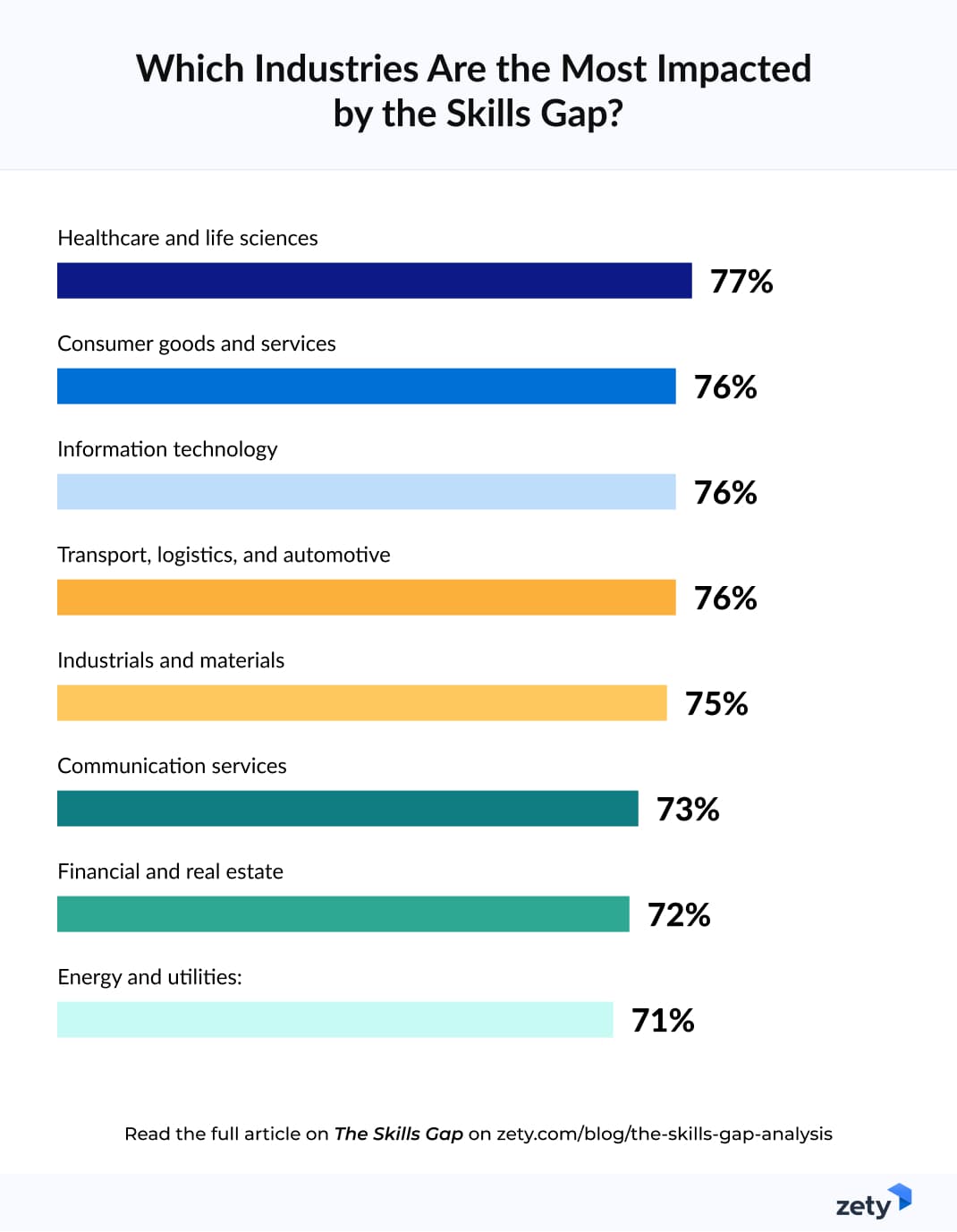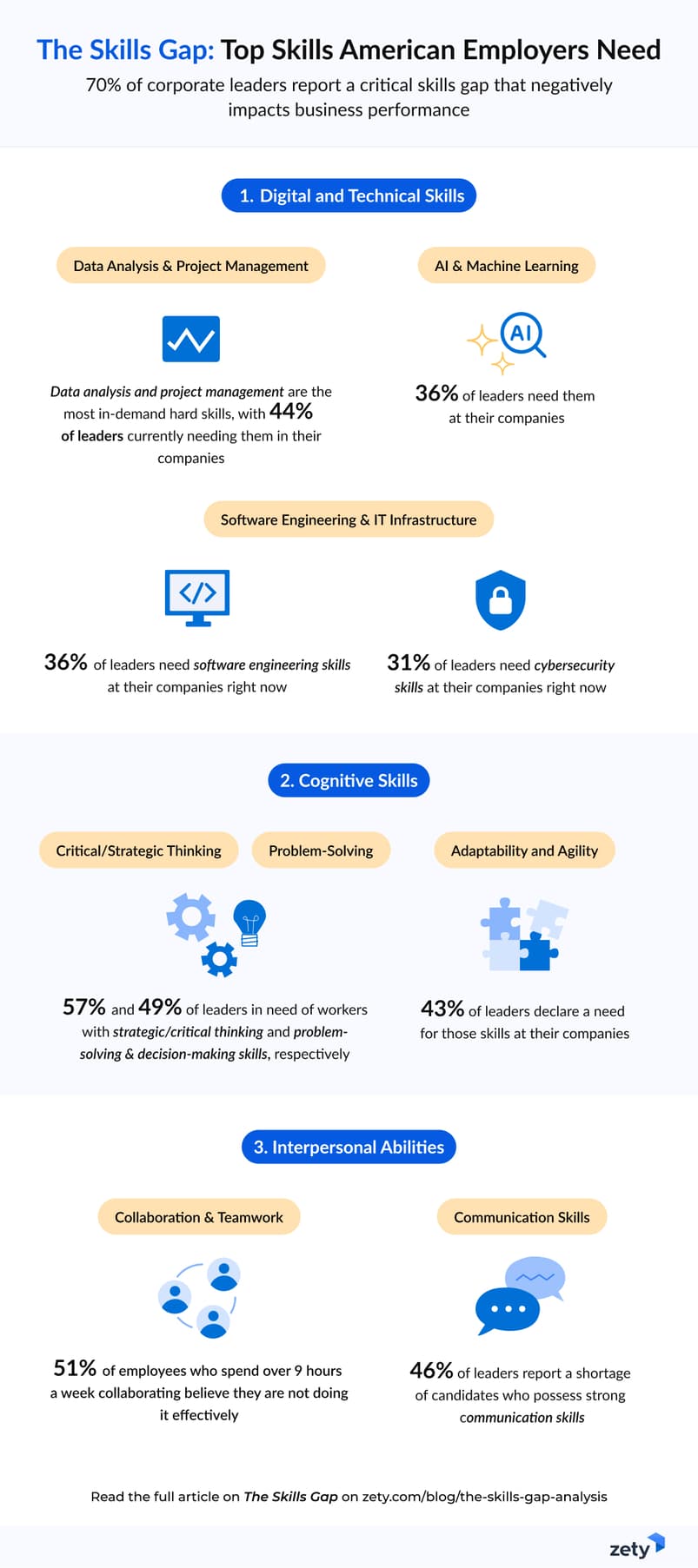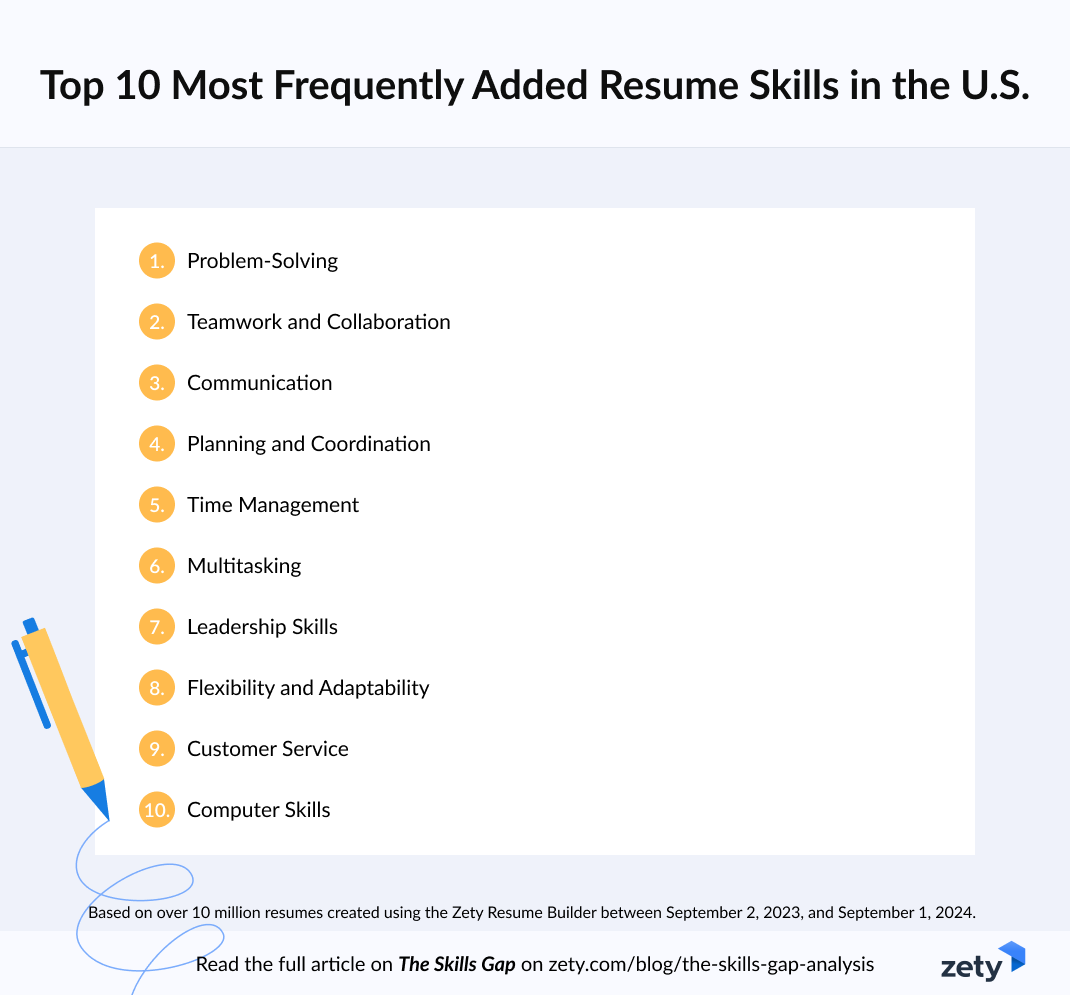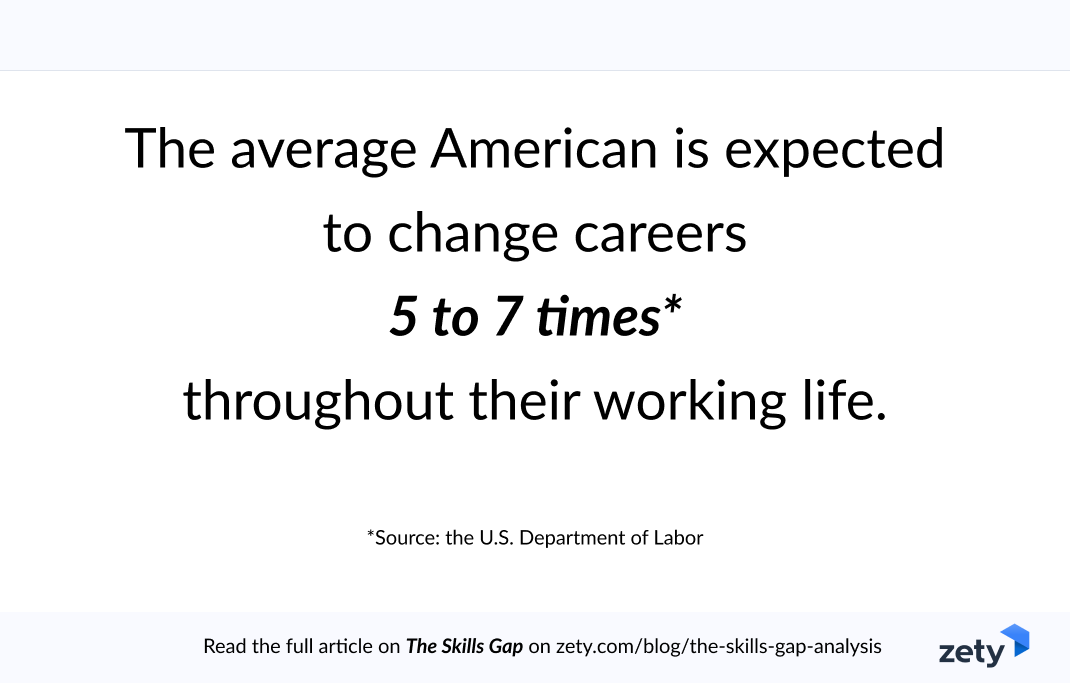Mind the Skills Gap: Navigating the U.S. Skills Gap in 2024
Create Your Resume NowYou’ve likely heard about the skills gap, but do you know which industries are most affected and which skills are in the shortest supply? In this article, I’ll explore the critical aspects of the skills gap that is currently shaping the U.S. economy and impacting Americans. We'll dive into the industries struggling the most, identify the skills employers desperately need, and discuss how this talent gap can be changed by AI.
What Is the Skills Gap?
The skills gap is the difference between the skills employers are looking for and the skills actually possessed by the workforce. As a result of the skills gap, employers struggle to find talent, and candidates have a more difficult time finding a job without additional training or education.
Which Industries Are the Most Impacted by the Skills Gap?
The skills gap issue is a wide-scale problem, but some industries are more impacted by resulting talent shortages. According to ManPowerGroup’s 2024 Global Talent Shortage report, these economic sectors are struggling the most in this regard:
- Healthcare and life sciences: 77%
- Consumer goods and services: 76%
- Information technology: 76%
- Transport, logistics, and automotive: 76%
- Industrials and materials: 75%
- Communication services: 73%
- Financial and real estate: 72%
- Energy and utilities: 71%

In the next chapter, we’ll focus on the actual skills that are the biggest contributors to the issue of the skills gap in the US.
Top Skills Employers Need but Struggle to Find
According to a recent Springboard survey, 70% of corporate leaders report a critical skills gap that negatively impacts business performance, particularly in the financial services and tech industries, where over75% of leaders perceive a lack of necessary skills.
These findings are confirmed by the 2024 survey by the New York State Department of Labor, which found that the quality of the available workforce is the number one challenge for employers across all industries.
Recent reports focused on the skills gap, such as Springboard's "The State of the Workforce Skills Gap 2024," McKinsey’s "A new future of work: The race to deploy AI and raise skills in Europe and beyond," and others, provide a detailed analysis of the specific skills that are in high demand but remain difficult for employers to find.
After a thorough research of these and various other reports, I concluded that the following groups of skills are some of the most important ones to the employers:

1. Digital and Technical Skills
Digital and technical skills are among the most challenging to find across all industries as technological advancements continue to reshape the workplace.
- Data Analysis & Project Management: According to "The State of the Workforce Skills Gap 2024," data analysis and project management are the most in-demand hard skills, with 44% of leaders currently needing them in their companies. Employers require professionals who can interpret complex data sets to drive business decisions and strategies. Project management is also critical as organizations strive for efficient project execution. The inability to find these skills hinders growth and innovation across multiple sectors, particularly in tech and finance.
- Artificial Intelligence & Machine Learning: The same report identifies AI and machine learning as the third most needed technical skills, with 36% of leaders needing them at their companies. As businesses increasingly integrate AI into their operations to enhance decision-making and automate processes, the demand for skilled professionals in these areas grows. However, there is a notable shortage of workers with expertise in developing and managing AI systems.
- Software Engineering & IT Infrastructure: Software engineering ranks equally with AI & machine learning among the most needed technical skills. With the rise of digital transformation, companies struggle to find skilled software engineers who can design, develop, and maintain robust software systems. Additionally, IT infrastructure skills, including cloud computing and cybersecurity, are in high demand but scarce.
2. Cognitive Skills
Employers also identify major shortages in cognitive skills, such as critical thinking and problem-solving. These skills are essential for navigating the complex and rapidly changing business environment.
- Critical/Strategic Thinking & Problem-Solving: Strategic thinking and problem-solving have become top priorities, with 40% of executives surveyed by McKinsey stating that they experience workforce shortages in terms of critical thinking and problem-structuring skills. The figures reported by Springboard’s survey are even higher, with 57% and 49% of leaders in need of workers with strategic/critical thinking and problem-solving & decision-making skills, respectively.
- Adaptability & Agility: The need for workers who can quickly adapt to new roles and learn new skills is present across all industries. With the rise of AI and the rapid pace of overall technological advancement, businesses need employees who are not only skilled in their current roles but also capable of evolving as job requirements change. This demand for adaptability and agility is significant, with 43% of leaders declaring a need for those skills at their companies.
3. Interpersonal Abilities
In addition to technical and cognitive skills, there is also a significant gap in people skills that are essential for effective workplace dynamics.
- Collaboration & Teamwork: Employers worldwide are struggling to find employees with strong collaboration and teamwork skills. As organizations increasingly adopt hybrid work models, the ability to work effectively within a team, both in person and remotely, becomes more critical, but a whopping 51% of employees who spend over 9 hours a week collaborating believe they are not doing it effectively, according to the 2023 Collaboration Trends Report by Mural.
- Communication Skills: Effective communication is crucial for maintaining productivity and fostering a positive work environment, particularly in roles that require extensive interaction with clients or across departments. However, according to Springboard, 46% of leaders report a shortage of candidates who possess strong communication skills, which impacts their ability to manage teams and projects effectively.
The Power of Soft Skills
I’ve also analyzed data from our resume builder. It clearly shows that the ten most popular skills added to resumes by our users are all soft skills. When analyzing data from all industries and professionals who added more than 10,000 different skills to their resumes, such results are to be expected, as technical skills tend to be job—or industry-specific qualifications.

However, the uttermost importance of soft skills is coming to the front of what’s expected from talent in the 21st century. Soft skills are almost always transferable skills, meaning investing in growing them is always a good idea since they’ll come in handy no matter where your career takes you; you’ll always get a solid ROI. This is crucial in the current reality, where the average American is expected to change careers 5 to 7 times throughout their working life, which is 2 times more frequent than in previous generations.

For too long, soft skills have been overlooked and treated as less important than hard skills. Maybe that’s what's causing the current market situation, with critical thinking, problem-solving, and communication skills in short supply.
With the rise of generative AI and remote work environments, these and other soft skills are gaining even more importance in the current workplace. I believe that AI won’t be able to replace these soft skills in the foreseeable future. Plus, working remotely requires having even better communication skills, as you usually can’t derive cues from the body language or the tone of voice of the person you’re interacting with.
It's no wonder that essential soft skills are increasingly being referred to as power skills. They are indeed the sine qua non of staying relevant in the current workplace, which seems to be changing even faster than in the past.
How AI Can Help with the Skills Gap Issue
AI can potentially be a transformative tool in addressing the skills gap in the U.S. As the job market evolves and technological advancements accelerate, the demand for new skills outpaces the supply of workers who possess them. This means that investing in reskilling the existing workforce will be needed.
AI can play a pivotal role in bridging the skills gap by enhancing training programs, providing personalized learning experiences tailored to individual needs and learning pace, and optimizing workforce planning.
By integrating AI into their training and development strategies, organizations can better prepare their employees and, in turn—themselves for the future, ensuring the talent they’ve hired has the skills needed to succeed in a rapidly changing environment.
So, such a forecast of the use of AI can bring some comfort to those who fear its impact on their professional future. After all, humanity has survived the Industrial Revolution and the rise of the Internet. While those transitions caused widespread concerns about job security, they ended up creating new jobs as a result.
Despite McKinsey’s predictions that AI will automate 30% of hours worked today in the US by 2030, nothing seems to indicate that the rise of AI should yield different consequences than the transformations experienced by our ancestors.
Summary
Here’s a short summary of the most important bits of information:
- Definition and Impact of the Skills Gap: The skills gap is the disconnect between the skills employers need and the skills workers possess, significantly affecting industries such as healthcare, IT, finance, and manufacturing, where talent shortages hinder innovation and growth.
- Most In-Demand Skills: Key skills that employers struggle to find include digital and technical skills (such as data analysis, AI, and software engineering), cognitive skills (like critical thinking and problem-solving), and soft skills (including communication and teamwork).
- The Role of Soft Skills: Soft skills are becoming increasingly crucial in the workplace, especially with the rise of AI and remote work. Skills like communication, adaptability, and strategic thinking are essential for navigating a rapidly changing job market.
- AI as a Solution to the Skills Gap: AI can help address the skills gap by providing personalized learning experiences, optimizing workforce planning, and enabling targeted upskilling and reskilling initiatives to better prepare employees for future job demands.
Methodology
The results of this study are based on the analysis of over 10 million real professional resumes written by users of the Zety resume builder—people of different ages from different locations, industries, and career stages. The resumes were created by professionals who, in total, added more than 10,000 different skills to their resumes. The analyzed documents were created from September 02, 2023, to September 01, 2024.
Fair Use Statement
Don't miss the chance to share these results—you might regret it! If you think this information will be of interest to your audience, feel free to share it for non-commercial purposes. In return, we ask that you link to this page so your readers can see the entire study.
About Zety’s Editorial Process
This article has been reviewed by our editorial team to make sure it follows Zety's editorial guidelines. We’re committed to sharing our expertise and giving you trustworthy career advice tailored to your needs. High-quality content is what brings over 40 million readers to our site every year. But we don't stop there. Our team conducts original research to understand the job market better, and we pride ourselves on being quoted by top universities and prime media outlets from around the world.
Sources
- U.S. Bureau of Labor Statistics, "Employment by major industry sector"
- McKinsey Global Institute, "A new future of work: The race to deploy and raise skills in Europe and beyond"
- McKinsey & Company, "Beyond hiring: How companies are reskilling to address talent gaps"
- Springboard, "The State of the Workforce Skills Gap 2024"
- ManpowerGroup, "2024 Global Talent Shortage"
- New York State Department of Labor, "2024 workforce survey results"
- Mural, "2023 Collaboration Trends Report: Addressing the Collaboration Skills Gap"
